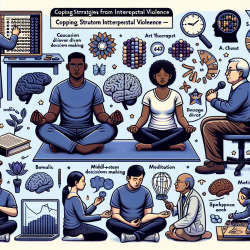Introduction
In today's diverse and interconnected world, practitioners in the field of speech language pathology must be equipped to handle the multifaceted challenges faced by children from various backgrounds. A recent study titled "Interpersonal Stranger Violence and American Muslims: An Exploratory Study of Lived Experiences and Coping Strategies" provides valuable insights into the experiences of American Muslims facing interpersonal violence and the coping mechanisms they employ. This blog post will explore how practitioners can utilize these findings to improve their skills and create positive outcomes for children.
Understanding the Study
The study, conducted by Agrawal et al., documents the experiences of interpersonal stranger violence among American Muslims and the coping strategies they employ. The research involved focus group discussions with 37 participants in the Maryland area, revealing incidents of verbal abuse, discrimination, bullying, and microaggressions in various settings. The study highlights the impact of the 2016 US presidential election and Islamophobic rhetoric on American Muslims, emphasizing the need for further research to understand the long-term health impacts of these experiences.
Key Findings and Implications for Practitioners
- Experiences of Violence: The study reports various forms of violence, including mental, physical, verbal, and structural, occurring in schools, workplaces, and communities. Practitioners should be aware of these experiences and consider them when working with children from Muslim backgrounds.
- Coping Strategies: Participants employed various coping mechanisms, such as community engagement, positive religious coping, and family support. Practitioners can encourage similar strategies in therapy sessions to help children build resilience and a supportive network.
- Role of Media: The study highlights the role of media in perpetuating bias and creating fear. Practitioners should educate children and families about critical media consumption and encourage open discussions about media content.
Practical Applications for Practitioners
Practitioners can implement the study's findings in their practice by:
- Creating safe and inclusive therapy environments where children feel comfortable sharing their experiences.
- Incorporating family and community involvement in therapy sessions to strengthen support networks.
- Encouraging positive religious coping and cultural identity as sources of strength and resilience.
- Providing resources and education on media literacy to help children and families navigate media content critically.
Encouraging Further Research
The study emphasizes the need for further research to understand the long-term impacts of interpersonal violence on health outcomes. Practitioners can contribute to this research by documenting and sharing their observations and experiences in therapy sessions. Collaboration with researchers can help develop evidence-based strategies to support children facing similar challenges.
To read the original research paper, please follow this link: Interpersonal stranger violence and American Muslims: an exploratory study of lived experiences and coping strategies.










